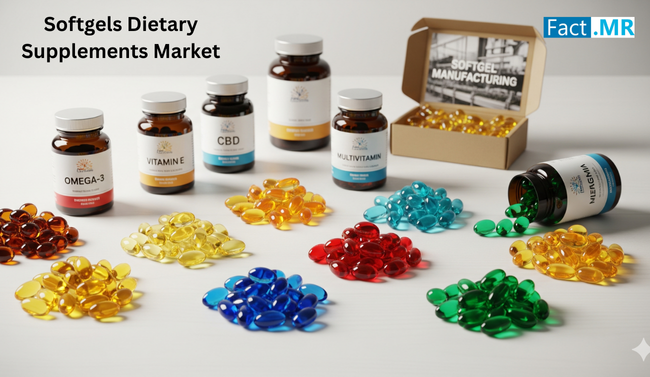The global softgels dietary supplements market is experiencing significant growth, driven by increasing consumer awareness about health, wellness, and preventive healthcare. Softgel supplements have gained popularity due to their convenience, ease of consumption, and superior bioavailability compared to traditional tablets and capsules. As lifestyle-related health issues continue to rise, consumers are turning to dietary supplements to fill nutritional gaps, improve immunity, and support overall well-being.
Market Overview
Softgels are a form of dietary supplements encapsulated in a gelatin-based shell, often containing oils, vitamins, minerals, or herbal extracts. They offer several advantages, including rapid absorption, precise dosing, and a smooth swallowing experience. This versatility makes them a preferred choice among health-conscious individuals.
The market is fueled by innovations in formulation, flavoring, and packaging, which enhance consumer appeal and usability. Manufacturers are increasingly investing in research and development to produce softgels with improved stability, efficacy, and targeted health benefits, catering to the growing demand for functional supplements.
Additionally, softgels align with current trends in preventive healthcare, as consumers increasingly seek supplements that can support immunity, cardiovascular health, cognitive function, joint health, and skin wellness.
Regional Insights
North America
North America leads in the adoption of softgels dietary supplements due to high consumer awareness, robust healthcare infrastructure, and a well-established dietary supplements industry. Consumers in this region are particularly focused on preventive health, driving demand for supplements that enhance immunity, provide essential nutrients, and support overall vitality.
Europe
Europe is another key market for softgels dietary supplements, characterized by a strong preference for natural and organic products. Regulatory standards in Europe are stringent, ensuring product safety, efficacy, and labeling accuracy. Countries in Western Europe are witnessing increased consumption of softgels due to rising awareness of healthy lifestyles, aging populations, and the popularity of preventive healthcare solutions.
Asia-Pacific
Asia-Pacific is emerging as a high-growth region for softgels dietary supplements. Rapid urbanization, rising disposable incomes, and increased awareness of health and wellness are driving the adoption of dietary supplements. Countries such as China, India, and Japan are witnessing growing demand for softgels that support immunity, general wellness, and age-related health concerns.
Latin America and Middle East & Africa
Emerging markets in Latin America and the Middle East & Africa are also contributing to the growth of the softgels dietary supplements market. Increasing awareness of lifestyle-related health issues, growing healthcare expenditure, and expanding retail channels are facilitating market expansion in these regions.
Key Trends & Forecast
Increasing Demand for Functional Supplements
Consumers are increasingly looking for softgels that provide specific health benefits beyond basic nutrition. Functional supplements targeting immunity, heart health, joint health, cognitive function, and energy support are gaining popularity. Manufacturers are developing innovative softgel formulations that combine multiple bioactive ingredients to address these health concerns.
Natural and Plant-Based Ingredients
The trend toward natural and plant-based supplements is influencing the softgels market. Consumers are seeking products made from herbal extracts, omega-3 fatty acids from fish oil or algae, and other naturally derived ingredients. The focus on clean-label products, free from artificial additives and preservatives, is shaping product development strategies.
Technological Advancements in Formulation
Advancements in softgel manufacturing technology are enhancing the stability, bioavailability, and shelf-life of dietary supplements. Techniques such as liquid-filled softgels, enteric coatings, and controlled-release formulations are improving the delivery and effectiveness of active ingredients. These innovations are meeting the demand for high-quality, premium supplements that provide measurable health benefits.
E-Commerce and Digital Channels
The growth of e-commerce and digital health platforms is transforming the distribution of softgels dietary supplements. Consumers are increasingly purchasing supplements online due to convenience, wider product selection, and access to detailed product information. This trend is prompting manufacturers and retailers to invest in digital marketing, direct-to-consumer channels, and subscription models.
Personalized Nutrition
Personalized nutrition is emerging as a significant trend in the softgels dietary supplements market. Companies are offering customized supplement packs based on individual health goals, dietary requirements, and lifestyle factors. Personalized softgels formulations allow consumers to target specific health concerns effectively, driving engagement and long-term loyalty.
Applications & End-Use Outlook
Softgels dietary supplements cater to a wide range of applications and end-users:
- Immunity Support: Supplements that enhance immune function, especially relevant in the post-pandemic era, are highly sought after.
- Cardiovascular Health: Omega-3 fatty acids and other heart-supporting nutrients in softgel form are popular among consumers focused on cardiovascular wellness.
- Cognitive and Brain Health: Nootropic softgels containing DHA, vitamins, and herbal extracts support cognitive function, memory, and focus.
- Joint and Bone Health: Glucosamine, chondroitin, and vitamin D softgels are used to support joint mobility and bone density.
- Beauty and Skin Wellness: Supplements containing collagen, vitamins, and antioxidants are increasingly consumed for skin, hair, and nail health.
Softgels are widely consumed across various demographics, including young adults, middle-aged consumers, and the elderly, reflecting their broad applicability in preventive healthcare and wellness routines.
Competitive Landscape
The softgels dietary supplements market is highly competitive, with key players focusing on product innovation, quality assurance, and global expansion. Leading manufacturers are investing in R&D to develop advanced formulations, improve bioavailability, and ensure compliance with regulatory standards.
Collaborations and partnerships between supplement manufacturers and healthcare providers are also shaping the market, enhancing credibility and expanding distribution networks. Strategic marketing initiatives, including influencer collaborations and educational campaigns, are helping brands increase consumer awareness and trust.
Additionally, private-label products and niche offerings are gaining traction, enabling retailers to cater to specific consumer segments while differentiating themselves from traditional brands.
Future Outlook
The softgels dietary supplements market is expected to continue its upward trajectory due to increasing consumer health consciousness, innovations in formulations, and expanded distribution channels. Key factors driving future growth include:
- Rising awareness of preventive healthcare and wellness.
- Technological advancements in supplement formulation and delivery systems.
- Growing preference for natural, plant-based, and sustainable ingredients.
- Expansion of e-commerce and personalized nutrition offerings.
- Increasing global demand for immunity-boosting and functional supplements.
As consumers become more informed about health and nutrition, softgels dietary supplements will remain a preferred choice for convenient, effective, and targeted wellness solutions.
Conclusion
The softgels dietary supplements market is evolving rapidly, driven by innovation, consumer awareness, and demand for functional, convenient, and high-quality products. Manufacturers that focus on advanced formulations, natural ingredients, and personalized solutions are well-positioned to capture market share and drive long-term growth.
With trends such as digital distribution, plant-based formulations, and functional wellness supplements shaping the landscape, the market offers significant opportunities for companies seeking to align with the growing global emphasis on health, nutrition, and preventive care.



